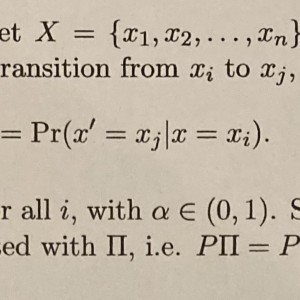Markov Process Problem
Any help is greatly appreciated. I'm completely lost.
Answer
We know that $P=P \Pi $. Also note that $P$ is a $1\times n$ matrix aka a row vector. So the k-th component of $P$ is $P$ times the k-th column of $\Pi$ :
$$ p_k =\sum _{i=1}^n p_i \pi _{ik} = \sum _{i=1}^n p_i \alpha = \alpha \sum _{i=1}^n p_i =\alpha 1=\alpha $$ since $P$ is a probability distribution and the sum of its components is one.
The interpretation is that if the probability of reaching the state $x_k$ from any state is the constant $\alpha$, then in the stationery distribution, which is the same as the probability distribution in the long run, the probability of being in the state $x_k$ is also $\alpha$.
 Martin
Martin
1.7K
The answer is accepted.
Join Matchmaticians Affiliate Marketing
Program to earn up to a 50% commission on every question that your affiliated users ask or answer.
- answered
- 1546 views
- $24.00
Related Questions
- Combinatorial Counting: Painting Streetlight Poles with Color Restrictions
- Singular Value Decomposition Example
- Why does this spatial discretization with n intervals have a position of (n-1)/n for each interval?
- [Discrete Mathematics] For {1,3,6,10,15,…}. Find a recursive formula.
- Probability of making a full house in a poker hand
- [Discrete Mathematics] Induction
- Discrete math
- How many balanced lists of n left and n right parentheses are there?

